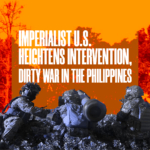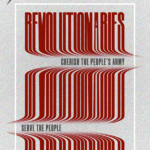Maya Flies
by Pat Gambao
The trek to a guerrilla front in Samar was an obstacle race. One had to scale hills, cross streams, walk miles of green fields, hold up through slippery bogs. And with the Office of the President’s recent Memorandum Circular No. 32 reinforcing the number of troops in the three regions (Negros, Samar, and Bicol) perceived to be the stronghold of the New People’s Army (NPA), enemies abound.
She was supposed to be with Rei, her co-member in the organization who had been to the front before. But he was to go to some other front. He just gave her lots of advice and instruction about the place and how she should conduct herself. He reminded her not to be shy to ask but that was another possible barrier, the language.
But Maya’s excitement to go to a guerrilla front for the first time, especially at the time when the Communist Party of the Philippines (CPP) had a celebration of its 50th year, overcame all difficulties. She was full of joy to join the celebration at the front with the Rodante Urtal Command’s Red fighters and the masses.
The Initiation
Maya grew up and studied in the city. As a scholar in college, she did not burden her parents with the exorbitant cost of education. Being a woman, her parents had simple dreams for her: finish her studies; get a job; marry by age 26; raise a family. It seemed her life has been programmed that way. Thus, her main goal then was to finish her studies, get a good job and be of help to the family.
The university had been the venue for Maya’s blossoming, her political and social discernment. For one a woman’s role is not confined to the family. She does not need to marry at once. She can focus on her career, equip herself. It is not true that because she is a woman, she can no longer pursue her dreams. Women empowerment was her peg then.
“While schoolmates called out for free tuition fees, I stood my ground,” she confessed. “I thought there was nothing wrong with increasing tuition fees because the school needs funds to sustain it.” Worse, being a scholar, Maya belittled the efforts of the students in their studies. For her they did not strive enough.
Since high school, she has shunned rallies, not because she had a negative notion on activism, but because she was after alternative solutions to the issues. Looking for said alternatives, she joined discussions, attended forums, and joined education sessions. “But I did not join any organization because of the notion that activists do not graduate,” Maya said.
However, in her sophomore year, as she continued attending education forums and as many of her friends became members of youth organizationa, Maya was swayed to join. “Hatak ng barkadismo (drawn by group mentality),” she laughingly admitted. “Just that, no commitment. Yet.”
She started to actively participate in the organization in her third year in college. Eventually, she also joined the Kabataang Makabayan, an underground national democratic youth organization. Discovering a new world beyond the confines of the university, her horizon widened, her understanding of social realities broadened, her commitment deepened. She kept it a secret to her parents, which was not difficult to do. For a journalism student, legwork, fieldwork, coverage, and projects were normal. However, she really failed to do mass work in the family to change their phlegmatic attitude on critical social issues. All she managed to do during their casual conversations was to answer their questions about current events. “Of course, I did not expect them to join me. All I wanted was for them to understand.” She said.
Treading the Petty Bourgeois Path
Although Maya was active in the movement, she has not given up her dreams. She would graduate. Find a job. Please her parents. She could still be of service to the country. She could apply what she learned in school. She did not see this as obstacle to her tasks in the movement. She believed it could even help. But she realized she was wrong. The demands of her job got on the way. Except for sharing a part of her salary to the movement, she no longer participated in the activities. She got in touch with her collective only through the social media. She missed their camaraderie and advice.
For one who is socially conscious like Maya, the pretensions of the corporate world, the primacy of self-interest, the squabble to satisfy one’s ambition, the boot licking, the lies are sickening, even depressing. In her work, she needed to portray the image of a good government—compassionate and truly serving its constituents. Under these circumstances, she could not give her best. She could not grow. The system is harsh, she needed to toe the line. Her worst fear: teh system is contagious, that she might be sucked up and lost her soul in the process.
The kissing-on-the lips incident involving Duterte and an OFW in Korea was discussed in the boardroom as a mere laughing matter. As a woman advocate, Maya could not take it, the misogyny of one who holds the highest and supposedly most respectable position in the land; the tolerance to such a boorish act. “I almost walked out,” she said.
Her father noticed that her articles seemed atypical of her person. “He asked me if I was okey with my job, if I could still put up with it. That did it. I decided to resign,” she shared.
Maya went full time in the movement after that, in a group where she was supposed to be assigned after graduation. Her parents had no inkling that she had left her job because she was still so busy. To cover up for her new status, she had to shuffle between her tasks in the movement and her “rackets” (odd jobs) to be able to still give some sum to her parents.
When the time came that she could no longer sustain her tasks and her job simultaneously, she decided to spill the beans to her parents who readily understood. “They are familiar with the ‘fulltime’ concept since they have been exposed to my fulltime buddies who used to frequent the house,” she explained. When her father blankly asked if she had joined the NPA, Maya laughingly retorted, “I am fulltime in the organization here, I have not even been to the mountains. See, I have no gun.”
“Of course there was the parental advice not to join the NPA, not to go up to the mountains, to think over my decision to go fulltime, to mull over my future family life,” Maya continued. Her father even offered to support her in law school, a dream she once cherished. The argument with her parents, especially her mother, was a greater hurdle.
The Decisive Option
Going to the countryside has always been a long-term goal for Maya since she was in college. But she knew she would work first, practice her profession. But when she met Rei, who had been in the countryside for some time, she was awed and inspired by his stories about the guerrilla front—the vibrant, valiant masses, the agrarian revolution, the revolutionary government. She thought a good three months or even six in the countryside would be fine, tolerable. She has the option to return if she could not really withstand it. She can always find work in the city because she is a degree holder. She has a fallback.
She planned to go back to the city after the 50th anniversary celebration with a vow to return for a longer stint. She would just prepare those she would leave behind. But she thought of the difficulties of coming back to the front once she’s back in the city such as raising money for her fare, the stern security arrangements, and most of all the enticement of urban life—the comfort, the culture, the race for affluence and fame, as well as the overriding parental influence. She feared her parents’ anger, not much at her but at the movement. Such fear is greater than her fear of death in the heavily militarized countryside. Although she thought it was still relatively safe in the front because the NPA is armed unlike the activists in the cities. This, to Maya, affirms the necessity and potency of armed struggle.
The simple and seemingly crude life in the countryside has its own allure though—life with the struggling masses is an inspiration and a challenge, the joy of interacting with them, learning from them, serving them. “I could not forget what Ka Ambo and Ka JR told me,” Maya professed. “The presence of youth from the urban centers joining the parag-uma (peasants) in their struggle, leaving behind the comfortable life in the city where opportunities abound, fires them to strive for the advance of the revolution. After all they (the peasants) are the ultimate beneficiaries.”
However, the process of remolding the personality, habits, and behaviour that one has been customed to, probably since birth, is such a Herculean task, greater than climbing a mountain. To leave behind the comfort of life, abandon the lofty dreams, forgo the urge for self-fulfillment is a tremendous challenge.
Maya is hopeful she could surmount the challenges as she integrates with the masses, as she gives her best, as she imbibes their culture, immerses in their struggle to rise above the penury of their plight and liberate themselves, liberate all of us, from the fetters of the oppressive and exploitative system.
As Maya stood with the Red fighters during the 50th anniversary celebration, fist raised singing the Internationale, she shed off all reservations and like a fledgling that just discovered its wings, she soared to her new life. ###
#YouthFightBack
#ServeThePeople
#CherishThePeoplesArmy
#HanggangSaTagumpay
#JoinTheNPA
—–
VISIT and FOLLOW
Website: https://liberation.ndfp.info
Facebook: https://fb.com/liberationphilippines
Twitter: https://twitter.com/liberationph
Instagram: https://instagram.com/liberation_ph




